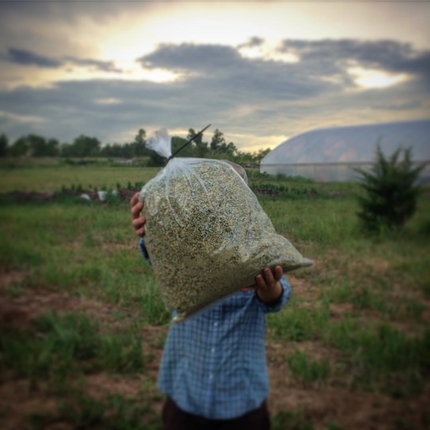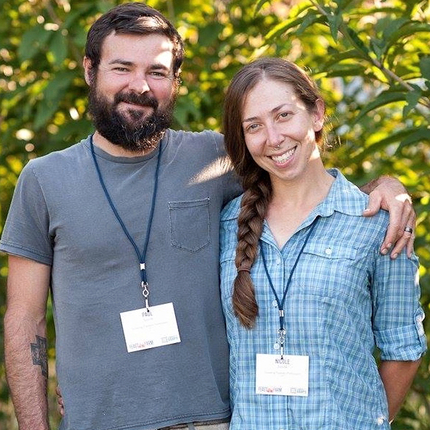Click here to check out a case study on Nicole and Paul.
Nicole and Paul Saville began their farming endeavor through the Community Crops Beginning Farmers Training Program in 2013. At that time, they grew specialty crops on one-eighth of an acre.
In the years since, the Savilles have continued to grow their business, Spiritus Vitae Botanicals, as well as the amount of land they have put into production. They had to relocate their farm several times over the years, but they were not deterred—until now.
Like many beginning and first-generation farmers, their ultimate goal was to find a plot of land to call their own, or at least to secure a long-term lease agreement. But with no solutions panning out, they have made the difficult decision to stop farming after 2021.
Nicole and Paul took advantage of several Center for Rural Affairs opportunities over their farming years, most recently when Nicole was accepted into the Center’s Savings Incentive Program.
The one-year program helps beginning farmers in business development, peer networking, and saving money for a specific asset goal. At the end of the year, participants who have met all requirements receive matching funds up to $1,500 to put toward the purchase of an eligible farm asset. Nicole’s initial goal was to save for a water wheel transplanter.
“Without the program, we would not have been saving for a water wheel transplanter because we didn’t think it was attainable, but it became attainable because of the match funds,” she said.
She and Paul were looking forward to advancing their efficiency in production with a transplanter and felt that the Savings Incentive Program was “a huge motivation and a huge help.”
When they found out they’d be losing access to the property on which they are farming, they put aside the idea of continued investment in tools, and looked instead toward viable land opportunities, pivoting their plans to use any and all savings toward a down payment.
“The biggest barrier has been (and continues to be) finding land,” Nicole said. “This is the number one struggle for anyone trying to break into farming. It can make or break the entire operation. And unfortunately, we haven’t overcome this obstacle just yet.”
They were not overly optimistic, but held onto lingering hope that something could turn up in their price range and location. As their land and business hung in limbo, they eventually had to make the call and announce their closure.
Letting their loyal customer base, and others in the area, know about their plans this spring has allowed them a final opportunity to move through existing inventory, sell planted perennials, clear out their greenhouse, and connect with the community that has supported them over the years.
The Savilles now have nearly a decade of experience in an industry that, especially as first-generation farmers, is no walk in the park. As with any business, multiple components overlap and must ultimately find their groove to work together.
On one side, production and marketing are important, but so are educating customers and considering public perception. Having genuine conversations with neighbors and others has made a big difference for Nicole with challenges regarding gender, scale, and type of crop. Farming while female and growing direct-marketed medicinal herbs in a region dominated by commodities created varied perceptions, depending on the audience.
“I’m not sure what the neighbors really think, but based on the questions and chuckles we get when telling them, I’d say they don’t understand what we’re doing,” Nicole said. “But that’s OK. Some are genuinely interested and we love when they ask questions.”
Being open to sometimes difficult conversations can help build bridges and help people see existing ways to relate to each other.
“If I could, I’d go back and tell myself to save up for property and purchase land first,” Nicole said.
She emphasizes the importance of getting connected to other growers.
“Don’t be afraid to talk to your farming peers,” she said. “They are the best resource for what works and what doesn’t.”
Specializing in medicinal herbs meant Nicole and Paul heavily relied on books when starting Spiritus Vitae. There weren’t, and still aren’t, many others doing what they were doing in this area. Regardless of what type of farming one does, neighbors and peers can be fountains of knowledge, and the relationship always works both ways.
Nicole encourages farmers to review their business plans regularly, as well. No stranger to change, she found that reviewing and updating her business plan was a way to reflect and document important changes and growth of the business over the years.
“Your business plan is a fluid living document, and it needs to change with all of your circumstances,” she said. “You need to be willing to modify it and be flexible.”
The experience gained by the Savilles in their farming careers will undoubtedly stick with them in all their future pursuits, and their advice will continue to benefit aspiring and beginner farmers.






